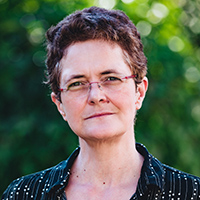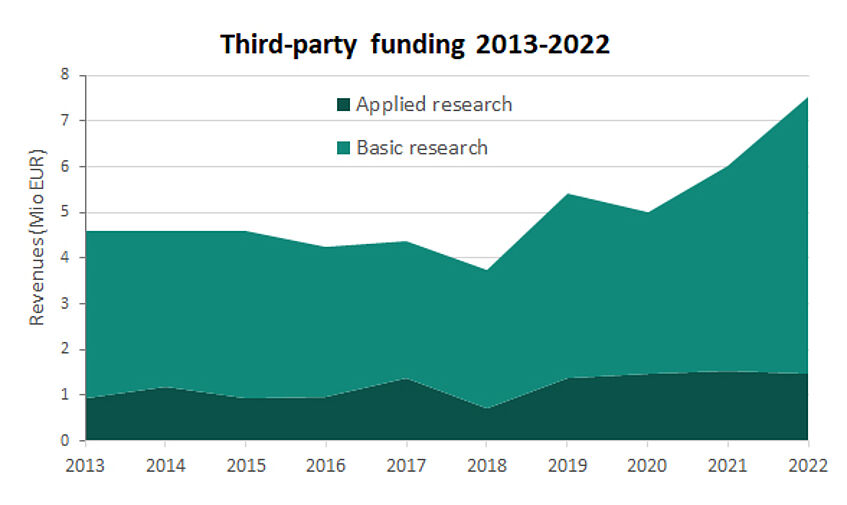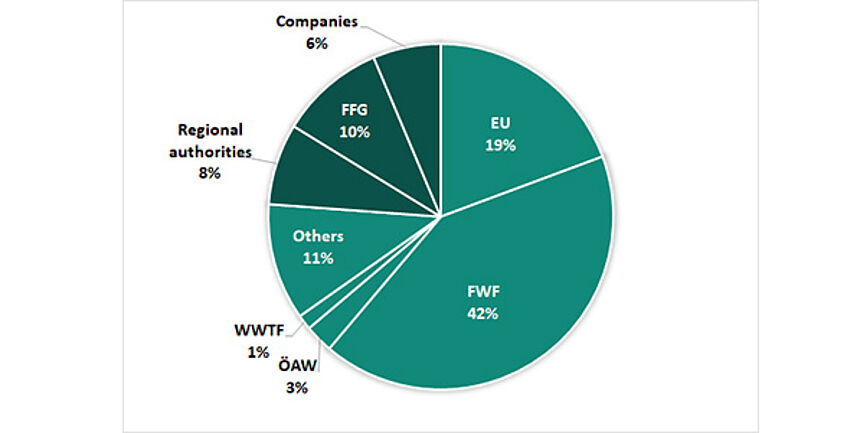Third-party Funding: “At the Interface of Science and Society”

Applied sciences @ FGGA: "Research at the interface of science and society"
07.03.2022
In 2022, the Faculty of Earth Sciences, Geography and Astronomy once again achieved a significant milestone in third-party funding, attaining a record-breaking revenue of 7.5 million Euros. In addition to their established support strategies, the “Faculty for Exploration” has created a new Applied Sciences Strategy, along with targeted measures.
Following our third-party funding achievement in 2021, our Faculty has once again attained a new third-party funding record: The FGGA generated revenue of 7.5 Million Euros in 2022. This sets a new standard, exceeding our previous achievements of 6.0 Million Euros in 2021 and 5.0 Million Euros in 2020.

Michaela Trippl, Vice-Dean of Research at FGGA. © Martin Jordan
„This accomplishment represents a crucial milestone and a resounding success for our Faculty, and is of utmost significance in the context of our ongoing evaluation”, notes Michaela Trippl, Vice-Dean of Research at the Faculty of Earth Sciences, Geography and Astronomy.
As funding opportunities become increasingly competitive and budgets tighten, there is significant potential for further growth in the area of applied research. “Although our Faculty has a strong focus on basic research, we have observed that approximately 25 percent of our third-party funding over the past decade has come from applied research projects, as per UNIVIE data” says Trippl and she adds: “We believe that there is ample room for further expansion in this field.”
New Strategy to Support Applied Sciences
With a view to enhancing the Faculty's applied research activities, the Dean's team has developed a comprehensive strategy that incorporates several key initiatives. These include the establishment of an information platform at the Faculty level, targeted networking programs, and enhanced communication efforts. “Our definition of Applied Sciences encompasses not only contract research for companies or public authorities, but also research collaborations funded by FFG programmes, as well as engagement with NGOs and civil society”, explains Trippl. Also citizen science projects, such as those supported through the citizen science initiative of our Faculty, represent a valuable form of applied sciences: “We view applied sciences as research at the interface of science and society”, says the Vice-Dean of Research.
New Website
As part of the “Faculty for Exploration’s” Applied Sciences Strategy, a new subsite of the Faculty’s website has been created to bundle information on Applied Sciences, including calls, project news, and invitations to internal and external networking events. “We are currently planning our next networking event for autumn, and will provide notice in advance. We are excited to bring together our applied researchers to facilitate exchange and knowledge transfer”, says Trippl. More
Online Event
To discuss open questions regarding the differences between contract research, research cooperation and research funding, the Faculty of Earth Sciences, Geography and Astronomy is organising an information event: Join us for an online meeting with Barbara Leitner from UNIVIE Research services on this topic on 23 March 2023 (event in German, registration until 20.03.2023; more)

Development of revenues of Third-party funded projects (basic research and applied research projects) 2013-2022.

Share of revenues regarding third-party funding sources 2013-2022: 42 % FWF, 19 % EU and 10 % FFG projects.
FGGA Applied Sciences Support Strategy at a Glance
- FGGA Applied Sciences Information Platform
- Continuous information about funding opportunities (website and newsletter)
- Custumized support for individual scientists (information about calls, opportunities for collaboration)
- FGGA Applied Sciences Networking Initiatives
- Internal events to build an FGGA Applied Sciences Community
- Contact point for external partners
- FGGA Applied Sciences Communication
- News coverage of internal events as well as external communication of new projects
Third-party funding support by FGGA
The FGGA actively supports their scientists in raising third-party funds and has established several support possibilities and initiatives in recent years:
- Third-party funding advice for all newly hired scientists (including Postdoctoral researchers) + visiting professors
- Information events on third-party funding in department seminars/working groups
- Networking group for administrative staff supporting management of third-party funding projects
- Promotion of Acquisition of Third-party Funding
- Bonus for the submission of larger third-party funded projects
- Short-term personnel support for the preparation of full applications for larger third-party funded projects
- Financial assistance for travelling for preparing larger third-party funded projects
- Support for proof reading
And, last but not least, the Faculty also acts as contact point and information hub through the third-party funding coordinator at the Dean’s office: “If you are thinking of applying for third-party funding – basic research or applied research – please do not hesitate to contact me early on; I will try to support you with helpful information”, says project coordinator Annekatrin Enge from the Dean’s office.
